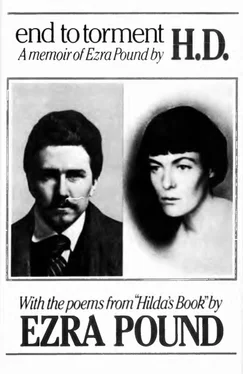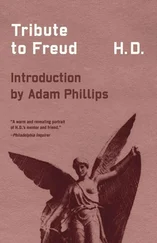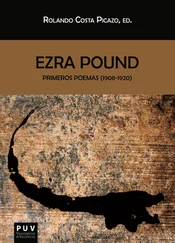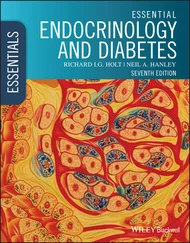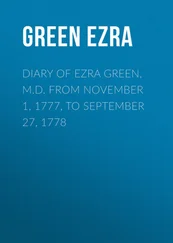May 14
“And now another canyon has been bridged by Ezra’s end to torment.” Ezra’s end to torment —that is all that matters. It is not easy to readjust, for it is only in retrospect that we dare face the enormity of the situation. There must be many others who feel as we do.
In Ezra’s early poem, “The Goodly Fere,” 41a tough Anglo-Saxon peasant fisherman tells the original Galilean story. He is the center of some kind of communal integration-disintegrating toward rebirth, as personally Ezra severed me (psychically) from friends and family. If having been severed, painfully reintegrated, we want only to forget the whirlwind or the forked lightning that destroyed our human, domestic serenity and security, that is natural. It is, in a sense, sauve qui peut .
I did not hear the raucous voice from Radio Rome. Friends listened and one especially, whose job it was to check up during the war on the BBC foreign broadcasts, said the effect was baffling, confused, confusing, and she didn’t feel that the “message,” whatever it was, was doing any harm or any good to anybody. It had, in a way, nothing whatever to do with us and the 20,000 victims of the first big air attacks and the fires in London. “Tudor indeed is gone and every rose.” 42No, Ezra!
May 15, Thursday, Ascension Day
To recall Ezra is to recall my father.
To recall my father is to recall the cold, blazing intelligence of my “last attachment” of the war years in London.
This is not easy.
Or it is easy enough in terms of Helen and Achilles , my 1952, 1953, 1954 “cantos,” as Norman called them.
And all that time, and years before and years after, Ezra was in “torment,” to use Norman’s word. “And now another canyon has been bridged by Ezra’s end to torment.”
May 17, Saturday
He blustered his way in, he blustered his way out. Violet Hunt’s very old mother, bedridden, with the door open at the head of the stairs, said fretfully, “Tell him to go away, tell him to go home, he always makes too much noise, that young Mr. Browning.”
He wrote an opera, Villon , broadcast, I read [in “Weekend”], in 1932 by the BBC. At least, he hummed tunes or whistled them and they must have been transcribed by some musical expert. I did hear Olga Rudge, the accomplished violinist, play some Provencal fragments in London in the early days, (I did not pretend to follow them), presumably composed or resurrected by Ezra. He seemed unintimidated by the fact that (to my mind) he had no ear for music and, alas, I suffered excruciatingly from his clumsy dancing. I suffered, indeed I suppose we all did. He himself, in a certain sense, made no mistakes. He gave, he took. He gave extravagantly. Most of the tributes to his genius, his daemon or demon, have come, so far, from men. But at least three women, whether involved in the emotional content or not, stand apart; he wanted to make them, he did not want to break them; in a sense, he identified himself with them and their art.
May 18, Sunday
There is, in another category, Eva Hesse with the German translations and there is Sister M. Bernetta Quinn whose “The Metamorphoses of Ezra Pound” I found so illuminating. There is of course Mary, “the 32-year-old wife of Prince Boris de Rachewiltz,” with her Italian translations of her father’s Cantos .
Last night, I heard on AFN, that Ezra Pound, the American poet, is to sail for Italy on the Cristoforo Colombo .
May 20, Tuesday
The exact Séraphitus image has emerged, manifested from Texas. I am caught away by the Time , May 19, account of the young pianist, “Van [Cliburn] is a born flaming virtuoso.”
“Lord, now lettest thou thy servant depart in peace.” Music was what I wanted. “What are you hiding?” I was hiding a craving, a hunger for music, such as I had known it as a schoolgirl, at the old Academy in Philadelphia. Once, too shattered to move, after a concert by Paderewski, I found myself alone in the vast empty circle of balcony benches. Clinging to a rail, I was surprised to perceive below me a furtive handful of dark figures clustered in the empty half-lighted theatre before the vacated piano. These were not of the fastidious, fashionable audience that had just surged out. Who were these modest, dark-clothed figures, so far below me, hat in hand, in their overcoats, standing, though now the comfortable plush-covered parquet stalls were empty? Who are they, critics making obeisance to the vacated piano, the empty bench? Who am I? We are of a secret order. The theatre seems to grow darker. It is obvious that we should not be here. The Maestro returned.
The Maestro came back, it almost seemed that he sneaked back, we are “in” on this together. There in the dim light, he played for us for almost an hour. My head was on my arms. I did not cry easily. But I was crying. He was playing Liszt’s symphonic setting of the Erl King .
Erl König , he was himself that Spirit. O Vater, mein Vater .
May 21, Wednesday
Prairie wild-fire — or what? It swept Russia, Leningrad, Moscow, “from Riga to Kiev,” and ourselves are caught up in “the love-affair between Van and the Russians.” What was an equivocal and terrifying enigma, the Soviet Union, becomes part of human consciousness, heart-consciousness. We need not torture ourselves with apprehension, a miracle has happened. I have laughed from time to time at Erich’s reference to a German or Germanic philosophy, Klages’ Cosmogonic Eros . 43We have laughed together. But here it is, it seems. We had almost given up hope of world reconciliation, but America in the person of this strange overgrown maverick (as Time calls him) proclaims, “These are my people, I guess, I’ve always had a Russian heart. I’d give them three quarts of blood and four pounds of flesh… This is familiar, evangelical. “Take, eat, this is my body.” Van, it is said, approached the former Viennese conductor, Josef Krips, before a performance of the Buffalo Philharmonic Symphony, and said, “Maestro, let us pray.” Van’s prayer was, “God give us His grace and power to make good music together.”
May 23, Friday
The Idol that should have been, that could have been, that was somehow “hidden,” was, is the Wunderkind . If I was not the Child, as I obviously was not (as a child), I would have the Child. But the thought, the wish, the will was cosmogonic — and I use the word flippantly, one can’t be too serious and it is a joke of Erich’s and mine. Yes, yes — I never told him of it but the Child at the Stadelhofen station, that summer day, before I went to America for my 70th birthday, was the Child, the Eros . And the Van, this Vanya is the Child. There must be others, perhaps many others. And Ezra, at one time, was an Idol, an Image of its adolescence, in its Ariel or Seraphitus stage. And all this is long ago, and today, and tomorrow, and “existentialist” as Erich would say.
June 4, Wednesday
Yes, all this is today. I have been slowly and laboriously typing these notes, since May 24. In the meantime, Undine emerges. She is a reflection-in-a-mirror, Undine, ghost-like. This is a picture that Norman sent me with a number of photographs of her own drawings and paintings. She has asked him to keep these and some of “la ceramica,” when she goes to Mexico. She took the photograph herself (of herself), reflected in the mirror, in a “bikini,” Norman wrote. It is a graceful little body, and the triangular face belies Rattray’s description in the “Weekend.” No doubt, the young man was puzzled and disturbed at the apparition, “perched like a bird at dusk … with her golden hair falling down around her thin shoulders.” As I reread the “Weekend,” the description, in light of later events, becomes even more poignant and revealing. “I assumed that she was a patient from another ward.” Norman writes that as he left St. Elizabeth’s after his visit, Pound “told me he was not seeing her but gave no reason and still asked me to help her.”
Читать дальше
